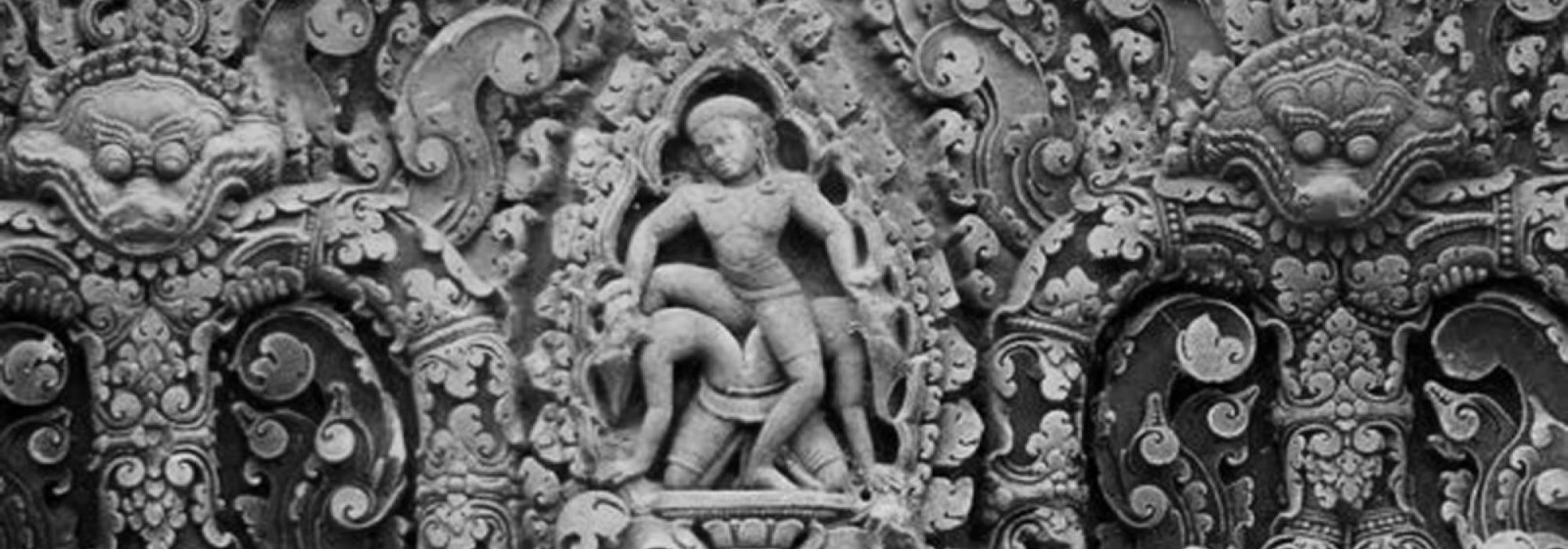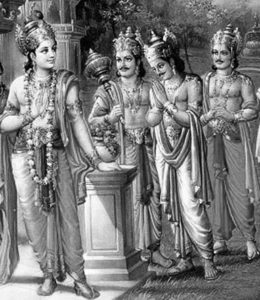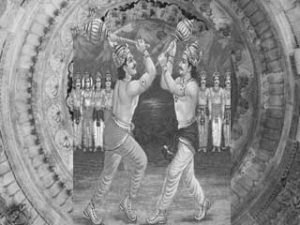SABHĀ-PARVA
Maya was a sculptor of the rākṣasas. He was one of the few who remained alive without getting charred to death when the Khāṇḍava forest burned; out of his gratitude towards Arjuna for letting him live, he built a palatial sabhā as per the latter’s request. Maya gave Bhīma a mahāgadā (great mace) and Arjuna a conch named Devadatta.
Dharmarāja, who started ruling from Indraprastha, adhered to dharma and was quite courageous; he carried out activities that would do good to the world at large and was never partial to anyone; all the citizens were the same to him and in his mind, there was no hierarchical distinction. He did not have enemies and came to be called ‘Ajātaśatru’ – i.e., one who had no enemies. After a while he decided to conduct the Rājasūya-yāga to attain the great spiritual heights that Hariścandra and others had attained in the past. He thus called his ministers and brothers for a meeting and discussed the matter with them. They said, “O King, you are certainly capable of performing this yāga; we are ready to take your orders!” The ṛtviks and purohitas too spoke encouraging words. However, Yudhiṣṭhira thought that he would need to contemplate upon several different parameters such as his own capability, the effect it will have on the land and on time, and the kind of gains and losses that such a yāga will cause. So he called for Kṛṣṇa, who had returned to his capital, Dvāraka. He broached up the topic with him. “This is not going to take place merely because I wished so. Kṛṣṇa, you know how to execute it; such activities must be carried out by emperors; all my friends and well-wishers tell me that I am fit to carry out such a grand undertaking, but I will not take a decision without having heard your opinion about it. Some do not tell me my shortcomings out of their affection towards me. Some others speak only that which pleases me; but you always give an unbiased and objective opinion, without any expectation of returns; you have transcended desire, anger, jealousy, and other such sentiments!” Upon hearing this, Śrīkṛṣṇa said, “O king! You are capable of performing the Rājasūya-yāga; you have the qualities that are needed to perform the task. Yet I have a couple of things to tell you. Jarāsandha has subdued all other kings and has proclaimed himself the emperor. Moreover, Śiśupāla and Dantavakra have become his followers and are his commanders-in-chief. People belonging to the clan of the Bhojas, Śūrasemas, Kosalas, and others have fled in different directions, fearing Jarāsandha. After I killed Kaṃsa, his wives Asti and Prāpti have taken refuge in their father Jarāsandha and are fuelling his anger against us. Due to our fear of him we shifted our capital from Mathurā to Dvārakā. Such being the case, it is not possible for you to perform the Rājasūya-yāga as long as Jarāsandha is alive. In my opinion, it is of utmost importance to get him killed and set free the kings who he has imprisoned.
In reply, Yudhiṣṭhira said, “Dear Kṛṣṇa, every house has a king, but it is difficult to acquire an empire; what is the use of self-aggrandization without knowing the strengths and weaknesses of others? Only he who is superior to the masses is revered by all. It is said that peace is the ultimate virtue but if one gives up everything and sits in silence, he will not attain peace; just because we have started an activity, it need not bring us superiority; this is exactly what every self-respecting person feels. Is it possible that one of us will, at some point of time, become superior to the rest of the world?” Bhīma said, “O king, a person who embarks on a task without careful planning will crumble like an anthill before a powerful rival; however, even a weak person, if he abandons lethargy and treads a dharmic path endowed with right planning, will emerge victorious when he faces even a mighty opponent. He will be able to acquire whatever gives him comfort in the long run. Kṛṣṇa is known for his shrewdness, I have a lot of strength, and victory resides in Arjuna; if the three of us work together, we can overthrow the king of Magadha!” Yudhiṣṭira said, “Yes, what you say is true. But then, how can I send you all on such a colossal odyssey with the sole selfish motive of acquiring lordship over this empire? Bhīma and Arjuna are like my eyes and Kṛṣṇa is like my mind. What kind of a life would that be, which is lived without the eyes and mind? It is of no use attacking such a powerful enemy. It seems like the Rājasūya is something that I cannot perform and I shall give up hopes of doing it!” Upon hearing this, Arjuna said, ‘O king, have we not acquired several different kinds of weapons, arrows, and large territory now? We belong to a brave lineage; I’m excited to undertake challenging tasks that require a display of valour. Despite all other qualities, valour is the sole trait that qualifies a kṣatriya and only a valorous warrior can subdue an enemy; even if a person possess all good but is not courageous, what can he achieve? A strong person should never speak of his strengths; he must not have illusions in that regard too – they will lead to his downfall! There is no greater deed that we can perform right now, other than killing Jarāsandha and rescuing the kings he has imprisoned; we possess all the qualities required to execute this task. Such being the case, why do you pretend that we are weak? Our strengths are as good as being absent if we don’t use them to perform such tasks! If we are seeking peace, we can easily don saffron robes later on; if you would like to have a large empire, we are ready to fight the enemy!”
Kṛṣṇa said, “These words befit Arjuna, the son of Kuntī and belonging to the lineage of the Bharatas. We don’t know when death will knock on our doors; we even don’t know if it will come during the day or at night. We’ve not heard that a person who doesn’t fight a war escapes death. The best a person can do is to execute tasks as per the guidelines of the śāstras and destroy his enemies. The best way to fight a war is to follow the least harmful path. Thus, if we go to the enemy territory and follow a well-planned scheme, we can defeat him just like a river that by its sheer force upturns a tree that blocks its path. In our attempt to rescue our allied kings, it doesn't matter whether we kill him or die in our attempts – in any case we will attain svarga. It is difficult to defeat him in a battle. If the three of us go there and taunt him while he is alone, he will get enraged and come to fight us; Bhīmasena can then kill him single-handedly, Yudhiṣṭhira! In case you trust me, please let Bhīma and Arjuna join me for a while.” The faces of Bhīma and Arjuna glowed with delight upon hearing this; Dharmarāja was ashamed and said, “Kṛṣṇa, Kṛṣṇa! Why do you speak this way? You are superior to us and we are your subordinates. Whatever you say is always right. You never seek the company of the weak; if Jarāsandha dies and the kings get rescued, the Rājasūya will take place! Thus, do as you please.” Kṛṣṇa left with Bhīma and Arjuna to Magadha in the guise of brāhmaṇas who had just finished their studies at a gurukula (called ‘snātaka’s). They passed through the provinces of Kurujāṅgala, the lake Padmaka, the mountain Kālakūṭa, the river Śoṇā, and the town of Mithila, finally reaching the Goratha mountain. From there, they could see Girivraja, the capital of the Magadha empire. They came to the city gates in no time. They did not enter the city through the gates but climbed the Caitya mountain that served as the city wall. They destroyed its peak and also broke the three drums that lay there. Then they entered the city and walked casually through the streets. They bought floral garlands and anointed their body with fragrant sandalwood paste. They went into the palace pretending as if they were going to inspect the cowsheds. Everyone was astonished looked at their tall and strong build; they looked like tall and sturdy Sal trees and mighty war elephants. They climbed up the three-storied palace where Jarāsandha lived, which was scarcely guarded. They met Jarāsandha, who gave them a ritualistic welcome by offering arghya and giving them water to soothe their exhaustion. He had great respect for snātaka brāhmaṇas. Even though they had come in the middle of the night, he extended a great deal of hospitality to them. After exchanging pleasantries, he said, “It is not normal for snātaka brāhmaṇas to wear floral garlands and to scent their bodies this way; I can see marks of bow-strings on your shoulders and you have the brilliance of kṣatriyas on your face. Tell me who you are. You have entered the palace in an unconventional manner and not through the main doors; you’ve donned these robes and haven’t accepted the hospitality that I extended to you. Why have you come here? Tell me! Are brāhmaṇas incapable of speaking?” In reply to this, Kṛṣṇa said, “People belonging to the three varṇas—Brāhmaṇas, Kṣatriyas, and Vaiśyas—can be snātakas. They need to adhere to sāmānya[1] and viṣeśa[2] niyamas. It brings great merit to a kṣatriya who follows these niyamas. Sandalwood paste and flowers are auspicious and thus we are wearing them. A kṣatriya is strong in his arms and not in his words; a kṣatriya’s words are not necessarily soft; you will soon see it for yourself. One enters a friend’s house through the door, but to enter an enemy’s house, one will need to take a thief's door; we have thus entered your palace in this manner. A person who visits his enemy’s house to achieve something should not accept any kind of hospitality; hence, we did not accept your hospitality!”
Jarāsandha said, “How am I your enemy? However hard I think, I’m unable to recall any kind of harm that I might have caused you. If you accuse an innocent person you will lose your merits and will go down the path of ruin!” In reply, Kṛṣṇa said, “O king! You have imprisoned several other kings. Is this not an evil thing? Do you consider yourself an innocent and good person even after having done so? We protect those in need and we’ve come to rescue our people and to punish you. If you think that there is no other kṣatriya who can match you, it is merely your illusion! Let us not cause harm to your children, your ministers, and your soldiers. In the past, Dambhodbhava and Kārtavīrya met their ends in a similar manner. We are not brāhmaṇas. I am Kṛṣṇa and these are Bhīma and Arjuna; we have come to fight you. Set free the kings who are in prison! If not, you will go to hell!” Jarāsandha said, “All the kings who I have imprisoned have been defeated by me; I can do anything to the people who I have defeated and such is the dharma of the kṣatriyas. Thus being the case, should I release them all, fearing you? I’m ready to fight. I can even have my army ready and fight you all. I’m also ready to fight one of you, two of you, or all the three of you!” Kṛṣṇa asked him, “Who among the three of us would you like to fight with?” and Jarāsandha picked Bhīmasena. Their fight ensued like a quarrel between an earthly emperor and Indra, the king of the deities. Both were strong warriors; they possessed immense strength in their arms and fought with great zeal. They took to wrestling, pulled each other, punched each other, and after a long time, it looked like Jarāsandha was losing. Kṛṣṇa then called out, “Show him the wind-like strength you possess, Bhīma!” Bhīma lifted him up, whirled him in the air, crashed him on to the ground, and killed him. Immediately, they dragged his body to the main door of the palace. Kṛṣṇa ascended Jarāsandha’s chariot and rushed to rescue the imprisoned kings. Later, he reached the open fields outside the city with Bhīma and Arjuna. The rescued kings thanked Kṛṣṇa and asked of what help they can be to him. Kṛṣṇa boosted their spirits and said “Yudhiṣṭhira will perform the Rājasūya-yāga; all of you help him in that!” They all agreed to support Yudhiṣṭhira and offered precious gems as a sign of gratitude to Kṛṣṇa. Jarāsandha’s son Sahadeva rushed towards them and surrendered. They assured friendship with him and returned to Indraprastha. Kṛṣṇa met Yudhiṣṭhira and said, “To our great fortune, Bhīma managed to kill Jarāsandha and the kings are rescued; Bhīma and Arjuna have returned without a scar on their body!” Yudhiṣṭhira bowed down to Kṛṣṇa and joyfully hugged his younger brothers. In this manner, the shrewd Kṛṣṇa had Jarāsandha killed by the Pāṇḍavas. After a few days, he bid goodbye to Kuntī, Subhadrā, and others and returned to his capital. The glory of the Pāṇḍavas grew with their killing of Jarāsandha and Draupadī’s love for them grew intense.
To be continued…
This is an English translation of Prof. A R Krishna Shastri’s Kannada classic Vacanabhārata by Arjun Bharadwaj and Hari Ravikumar published in a serialized form. Thanks to Śatāvadhāni Dr. R Ganesh for his thorough review and astute feedback. Additional segments from the epic and notes by the translators have been added in the footnotes after going through the Critical Text of the Mahābhārata.
[1] Rules and principles that are applicable to all; these include basic human values like honesty, cleanliness, fortitude, etc.
[2] Rules that are applicable particularly to certain groups of people.



















































